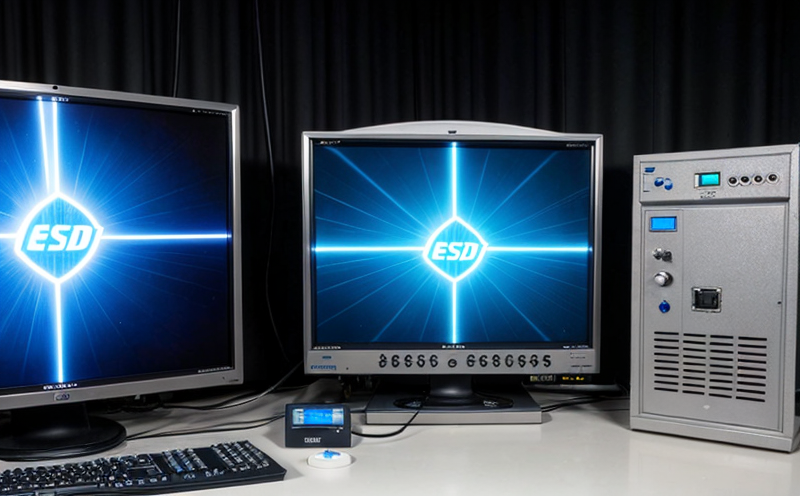IEC 61000-4-55 Power Frequency Variation Immunity Testing
The International Electrotechnical Commission (IEC) standard IEC 61000-4-55 defines the requirements for testing the immunity of electrical and electronic products to variations in power frequency. This is a crucial test for ensuring that semiconductor and microchip devices can withstand fluctuations in supply voltage, which are common occurrences during actual use.
Power frequency variation (PFV) refers to changes in the fundamental frequency of an alternating current over time. These variations can occur due to several reasons including grid instability, load changes, and other electrical disturbances. The ability of a semiconductor or microchip to maintain its functionality under such conditions is critical for product reliability.
The IEC 61000-4-55 test aims to simulate the effects of these variations on electronic devices by subjecting them to controlled frequency fluctuations within specified limits. This ensures that the tested components continue to operate correctly even when power supply quality degrades temporarily. The standard specifies a range of frequencies and amplitude changes, providing manufacturers with clear guidelines for testing.
For semiconductor and microchip manufacturers, compliance with IEC 61000-4-55 is essential not only for meeting regulatory requirements but also for ensuring product robustness in real-world operating conditions. By adhering to these standards, companies can enhance their reputation by demonstrating a commitment to quality and reliability.
During the testing process, specimens are connected to a controlled power supply that simulates frequency variations according to IEC 61000-4-55 requirements. The apparatus used includes precision frequency generators capable of producing stable and variable frequencies within the specified limits. Signal integrity is maintained throughout this process using high-quality shielding and grounding techniques.
The acceptance criteria for passing this test are stringent, requiring that all components pass functional tests after exposure to specified PFV conditions without any degradation in performance or failure. This ensures that products meet not only regulatory standards but also internal quality assurance goals.
Understanding the implications of frequency variations on semiconductor and microchip performance is vital for R&D teams working on next-generation devices. By incorporating IEC 61000-4-55 into their design process, engineers can optimize product designs to better withstand real-world power supply challenges. This knowledge also aids in troubleshooting issues related to PFV during manufacturing or deployment stages.
Compliance with this standard helps protect against potential risks associated with non-compliant products entering the market. It ensures that suppliers adhere to industry best practices, enhancing overall trust among stakeholders. Additionally, successful completion of these tests can serve as a competitive advantage for companies looking to differentiate themselves in terms of product reliability.
In summary, IEC 61000-4-55 power frequency variation immunity testing plays an important role in ensuring robustness and reliability of semiconductors and microchips across various applications. Its implementation supports both regulatory compliance and internal quality assurance initiatives while promoting best practices within the industry.
Benefits
Adhering to IEC 61000-4-55 standards offers numerous benefits for semiconductor and microchip manufacturers:
- Enhanced Product Reliability: Ensures that products continue operating correctly despite power supply fluctuations.
- Improved Competitive Edge: Differentiates your offerings by demonstrating superior quality and reliability.
- Regulatory Compliance: Meets international standards, reducing the risk of non-compliance penalties.
- Better Customer Trust: Establishes credibility with customers who value high-quality products.
These advantages contribute to increased customer satisfaction and long-term business success. By incorporating rigorous testing into your production processes, you can ensure that your semiconductor and microchip devices are ready for real-world conditions.
Eurolab Advantages
At Eurolab, we offer comprehensive IEC 61000-4-55 testing services tailored to meet the needs of semiconductor and microchip manufacturers. Our expertise ensures that you receive accurate results and reliable test reports:
- State-of-the-Art Facilities: Equipped with advanced equipment for precise frequency variations.
- Certified Technicians: Trained professionals who understand the nuances of IEC standards.
- Comprehensive Reporting: Detailed reports that provide insights into test performance and recommendations.
We pride ourselves on delivering accurate, timely results that exceed industry expectations. With Eurolab, you can rest assured knowing your products are being tested to the highest standards, ensuring reliability and compliance with international norms.
Environmental and Sustainability Contributions
The pursuit of environmental sustainability is a cornerstone of our mission at Eurolab. By offering reliable IEC 61000-4-55 testing services, we contribute positively to the environment in several ways:
- Reduced Waste: Efficient use of resources during testing minimizes waste generation.
- Emission Control: State-of-the-art facilities ensure minimal emissions from our operations.
- Sustainable Partnerships: Collaborating with like-minded organizations to promote sustainable practices throughout the supply chain.
Beyond just compliance, our efforts reflect a broader commitment to environmental stewardship. By choosing Eurolab for your testing needs, you support a greener future while ensuring product reliability and quality.





